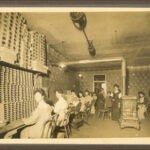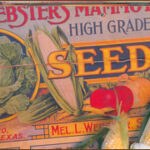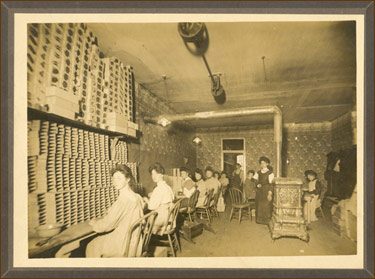
Webster Seed Co. – 1908
WEBSTER SEED CO- INDEPDNENCE, IA.
Article that appeared in “The Conservative” Independence 1930:
“The Mel L. Webster Co. is engaged in selling vegetable and flower seeds. Mel L. Webster, the founder of the company, began packeting seeds in 1989, when he was engaged in the retail grocery business in Independence.
Mr. Webster’s packet seeds met with favor from retail merchants in the vicinity of Independence, and he gradually extended his territory, visiting merchants by train and with horse and buggy. The company has still on its list of all customers merchants in Iowa, Wisconsin, Indiana, and Mississippi who have handled Webster’s Seeds for over 30 years.
The Mel L. Webster Company, a corporation, was organized and combined with the Rush Park Seed Company. A large building was erected on Chatham Street, at the present site of the Ward Chick Hatchery. This building was destroyed by fire August 6th, 1918. The business was then moved to King’s Hall, its present site.
The business of the company expanded from 1918 to 1921, and in 1921 in company with many other seed businesses, due to wide fluctuations in supplies and values of inventories, went into hands of creditors’ committee. R.F. Clarke, P.J. Sheehan, R.B. Raines, C.V. Rosenberger, W.C. Littlejohn and M.O. Fouts were local members of the creditors committee.
In 1927, the business was sold to the present company. P.J. Sheehan is the President Hon. R.W. Hasner vice-president, and John L. Cherry and Messrs. Sheehan and Hasner are the three trustees. The shareholders in addition to the trustees are Mr. and Mrs. Mel. L. Webster, C.V. Rosenberger, M.O. Fouts, L.C. McGill, Neva Morse Jones and Roy A. Cook. Messrs, Sheehan, Fouts, Rosenberger and Mrs. Jones were identified with the old company since 1918. Mrs. E.G. Wolfe is treasure, Paul F. Sheehan office manager, and Harold Kline, who has been with the business for 30 years, is foreman of the packing, shipping, and warehouse departments.
Mr. Webster, founder of the company, has this spring been making good-will visits to merchants in Alabama, and expects to continue during the summer calling on merchants in Northeastern Iowa who handle the Company’s seeds. With a background of the forty years in the seed business, he finds his calls much appreciated by the merchants handling Webster’s Seeds.
Fred J. Damge, a brother of Mrs. Dan Gleason, is one of the oldest salesmen in point of service. He lives in Waterloo where he has some 40 Webster accounts. L.M. Freeman ranks with Mr. Damge in point of service. He has sold more seeds in more states for the company than any other salesmen. He sold in Florida, Georgia, and South Carolina this spring, and sells this summer in central Illinois.
Will Adams is selling in Louisiana this spring, Ray Pike in Texas, O.L. Engstrom in Arkansas, Fred Rule of Des Moines, and P.J. Plane of Independence, in Mississippi. Walter Collins of Sherman, Texas sells in Texas and southwestern states.
The office employees include Josephine Till, stenographer, Hazel Black, route clerk, and Mabel Orr, order clerk. Employees in the warehouse, packing and shipping departments include Irving Sherwood, Ethel Kline, Louise Sweitzer, Bernice Morton, Zola Rose and Lee Black. The shipping season runs from July until March. Some 30 employees are used in the packing and shipping departments during the peak of the season, that extends from November until March.
The company has an annual payroll of approximately $50,000.00, most of which is spent locally. The company is owned entirely by home folks and most of the salesmen reside in Independence. The salesmen travel in 20 states in the central west, north and south, selling in Florida, Wisconsin and the east, and in Minnesota, South Dakota, Nebraska, Kansas, Oklahoma and Texas, and on the west, and in the states between.
The company has its largest has its largest number of merchants handling Webster’s Seeds in Iowa, where some 1,200 stores sell Webster’s Packet Vegetable and Flower Seeds. Illinois is the next in number, with some 900 merchants selling Webster’s Seeds. This annual output is 6,000,000 vegetable packets and cartons, and 750,000 flower seed packets.
Webster’s Seeds, both vegetable and flower sorts, are marketed in freshly sealed packets sold direct from the factory to the homer merchant. None of the Webster’s Seeds are sold by chain stores, such as Woolworth’s, Kresge’s, Montgomery Ward, the experience of the company being that home merchants have a better outlet for packet seeds than chain stores, the home merchants selling to more discriminates customers and handling a better grade of seeds in packets than chain stores, that are principally concerned with lower costs than with high grade in seeds.
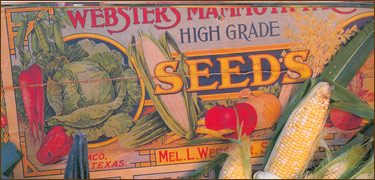
A striking feature of Webster’s Seeds since 1889 has been the uniform good quality. Following the high years in the seed business after the war, there was a split in the seed business, some seedsmen going to 10cent vegetable packets, others retaining the 5 cent seed packet. The Webster Seeds have been sold at 5 cents while retaining the same high quality of seeds, hence the Webster slogan: “Good Seeds since 1889.”
A feature of the Webster Line is the display rack for seed packets, which accommodates two, three or four corrugated board cases, giving a superior method of displaying Webster’s Seeds. These display cases and racks were developed by Mr. Webster and Mr. Kline for the company’s business in 1920 and 1921, and have since been considerably improved by the company. The largest single seller in vegetable seeds is beets, and the largest flower seed sale is in nasturtiums. The largest volume of seeds handled is in beans, of which over a carload are used annually. Peas, with nearly a carload, rank second in volume.
The following is a quote from “History of Buchanan County, Iowa and It’s People” by Harv C. and Katharyn Chappell 1914:”
“The Rush Park Seed Company, one of the largest seed depots in the west, was organized and incorporated in November, 1889, 25 years ago, and went into the seed business on a comparatively small scale, occupying one store building on Chatham Street, opposite the post office. The next year after organizing, their business had increased to such an extent that they were compelled to greatly enlarge their facilities, then occupying the 3rd floor of the building.
The growth and success of the Rush Park Seed Co. was phenomenal and unprecedented in the history of the seed business and steadily increased with no special effort on the part of the management outside the good business management and indomitable energy that characterizes the firm. While yet it was a young concern, it did as much business as the best of its competitors, and in fact, furnished nearly as many seed packets on a straight out and out sale as all the others combined. This fact can be attributed solely to the fact that its method of doing business has met the approval of the businessmen to whom it has looked for support and also to the fact that its seeds have been of such high quality that the firm built up for itself such an enviable reputation.
Its 1896 catalogue compriced an edition of 8,000 copies – 60 pages fully illustrated while the 1895 edition has only a 6,000 20 page pamphlet. They employed a force of 7 traveling salesmen, who covered a territory comprising the 7 or 8 states surrounding Iowa and many of the southern states. 24 people were employed in the house. The company had about 3000 regular customers and put out about 5000 cases of packet seeds besides several carloads of loose seeds sold in bulk, some shipments of carload to a customer. An average of 1,600,000 packages, 6,000 bu. Peas, beans and corn, 6 tons of turnip seed, 3 tons onion seed, 3 tons beet seed, 2 tons pumpkin seed, 2 ½ tons radish, 2 tons melon and squash, 1 ½ tons cabbage and 1 ½ tons cucumber seed. There are sample figures and all other seeds run in proportionally large figures, and large quantities of field grains; timothy, clover, millet, buckwheat, etc., are also handled.
The Rush Park Seed Co. received numerous very tempting offers from larger cities to remove their plant and business from Independence, and seriously contemplated accepting some offer, however, as the homes of all members of the company were here, they would forego the undoubted advantages offered elsewhere, it the people taxation for 10 years. A motion was made at the council meeting that a resolution be adopted recommending the proposition to the favorable consideration of the citizens. A council committee was appointed to act in connection with a citizens’ committee. A diligent canvas was made, and the committees secured on a basis of the erection of an $8,000 or $10,000 building, subscriptions aggregating $850, which could be increased to about $1,000 if necessary. The company wanted the Rookery site, 40X165 ft., but the exorbitant price asked placed it out of reach. H.E. Palmer offered to give the corner lot north of Joslin’s store, 5×10 rods, to the company, if they would build on it, and would sell the lot north for $500.00. The company finally accepted a proposition of 10×10 rods and a bonus of $500 dollars cash, with which they bought the lots north of those donated and began immediately to erect a $6,000 building. The council did not exempt the company from taxes, but reduced the amount.
In July, the company’s mammoth building was burned to the ground, a total loss amounting to $14,000 but the next day a temporary office was in readiness and business was resumed. A new building arose phoenix-like, and in a short time all effects of the conflagration were completely wiped out, and a larger, more complete and convenient edifice was in its place.
The building is 3 stories high in addition to the basement and has a floor capacity of 23,520 sq. ft.
In May 1897, M.L. Webster, who has been connected with the Rush Park Seed Co. since its organization, sold his interest to D.S. Jones and J.O. Littlejohn and those gentlemen became equal partners in this establishment, and Mr. Webster started a seed business at the original location of the Rush Park Seed Co.
See Rush Park Seed Co. for more information.
Attached Images

